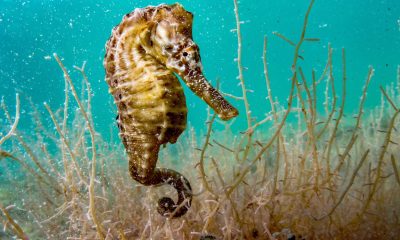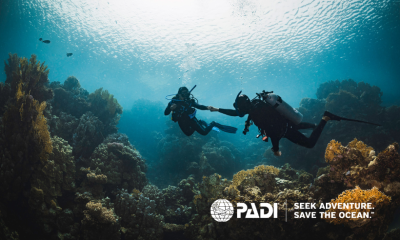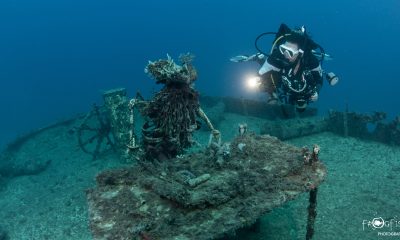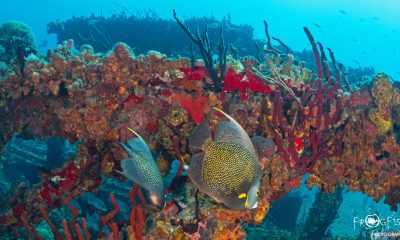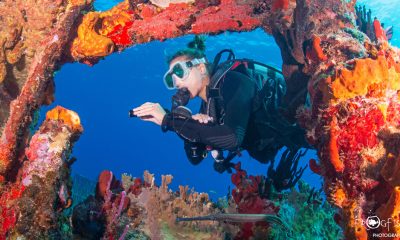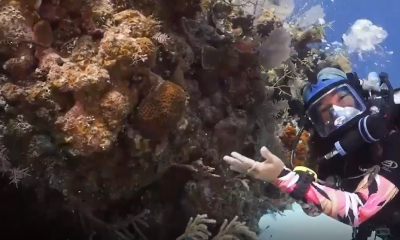News
Caribbean Conservation in Action: Tagging Turtles in the BVI
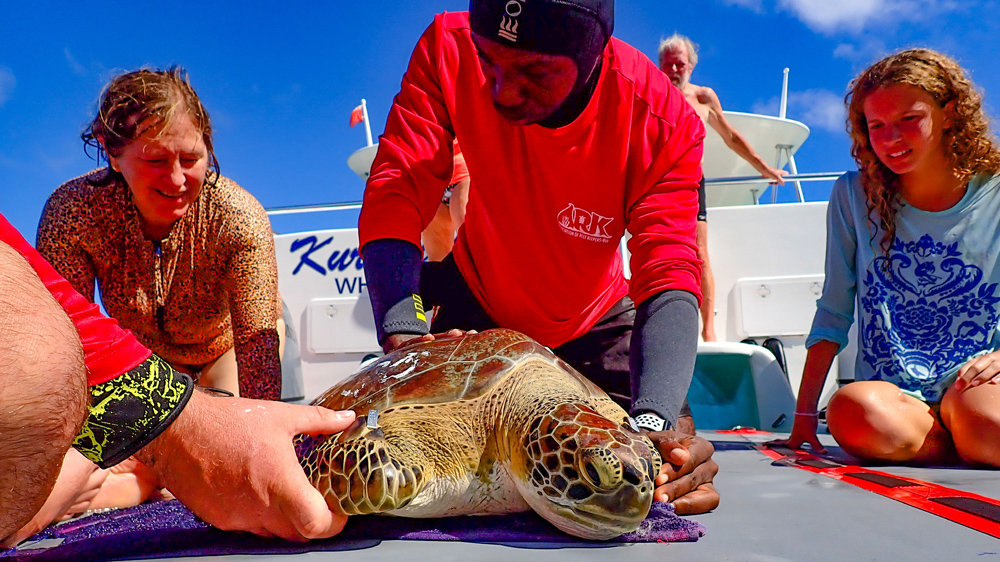
For centuries, the Japanese artisans have used hawksbill turtle shells to make a variety of trinkets such as eyewear, combs and cigar boxes. By the 1800’s, a fad had spread to the America’s and Europe to obtain hawksbill shells and green turtle soup had become a delicacy around the world. It wasn’t until the late 1970s when the Convention on International Trade in Endangered Species of Wild Fauna and Flora (CITES), the body that regulates cross-border trade in wildlife banned the international commercial trade of sea turtles and in 1978, the United States banned the intentional killing of all sea turtles under the Endangered Species Act.
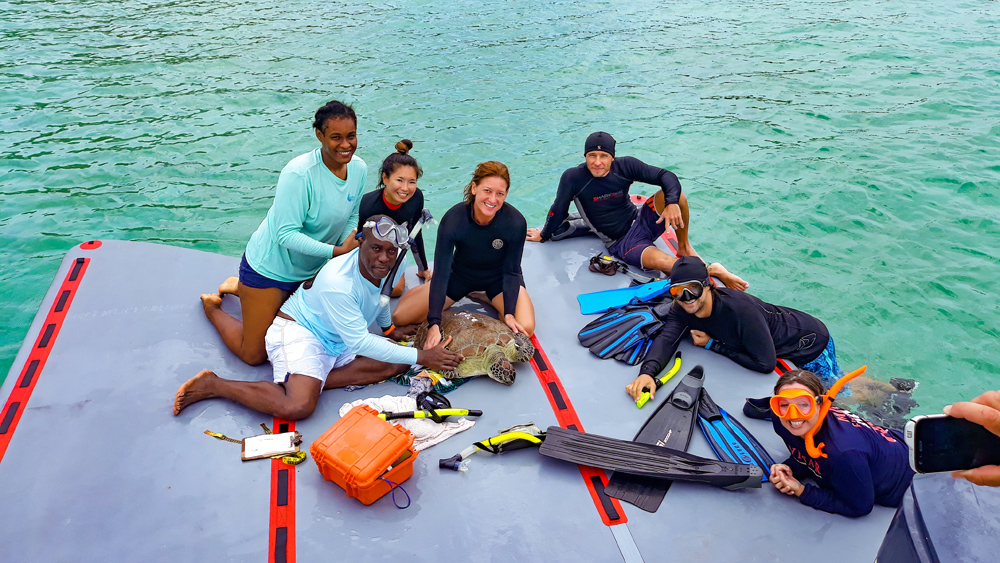
However, In the late 1990s and early 2000s, Japan tried to lift restrictions under CITES to reopen the trade of hawksbill turtle shells with Cuba. Because sea turtles are a regionally shared resource due to their highly migratory range over an individual’s lifetime, many Caribbean countries became concerned that Japan and Cuba’s proposal would undermine some of the long-standing conservation efforts that had already been implemented. This prompted the United Kingdom to launch the Turtles of the UK Overseas Territories (TCOT) project in 2001 to address critical gaps in the knowledge of marine turtle populations found in all their Caribbean territories (Anguilla, Bermuda, British Virgin Islands, Cayman, Montserrat and Turks & Caicos Islands).
Although the BVI was already monitoring nesting leatherback sea turtles, this 3-year UK-funded project brought a new dimension to turtle monitoring to the BVI and other UK Territories. In-water turtle tagging of foraging populations commenced which identified healthy populations of juvenile to sub-adult (teenage) green and hawksbill turtles in the BVI. Through genetic sampling of those turtles tagged, green turtles were identified as coming from as far away as Ascension Island, Venezuela and Costa Rica with hawksbills coming from Brazil, Barbados, and Cuba. Subsequently, some of the tagged turtles have migrated from the BVI on to their adult foraging grounds and travelled as far as Nicaragua, Bonaire and Guadeloupe.

Although the TCOT project ended many years ago, in-water turtle tagging of foraging populations continued over the years. Now, with an extensive baseline of information and a growing need for changes in local sea turtle management, the BVI was awarded a Darwin Plus grant worth over US$300k from the UK’s Overseas Territories Environment & Climate Fund in June 2020. This newly implemented STEEL Project (Sustainable turtles, environments, economies & livelihoods) is aimed to ramp up tagging efforts to better understand changes in the status of BVI turtles based on nearly 20 years of data collected. Additionally, foraging turtle habitats will be assessed on how to build resiliency in areas that were impacted by the 2017 hurricane events. An educational programme to provide the community with a better local understanding of turtle conservation will be implemented and, using the MCS Community Voice Method (CVM) of engagement, the project will engage BVI communities to develop new legislation recommendations and a conservation action plan to safeguard BVI’s turtle populations for future generations.

The STEEL Project is being led by the Marine Conservation Society UK alongside local organisation, the Association of Reef Keepers (ARK) and partnerships with the BVI Government’s Department of Agriculture and Fisheries and the Ministry of Natural Resources, Labour and Immigration. Additionally, local dive and tour operators such as Sail Caribbean Divers are participating in the project by providing boats and assisting local turtle scientists in capturing, tagging and releasing of sea turtles.
For more information see www.bviark.org
News
Seahorse National Park announced on Eleuthera in The Bahamas
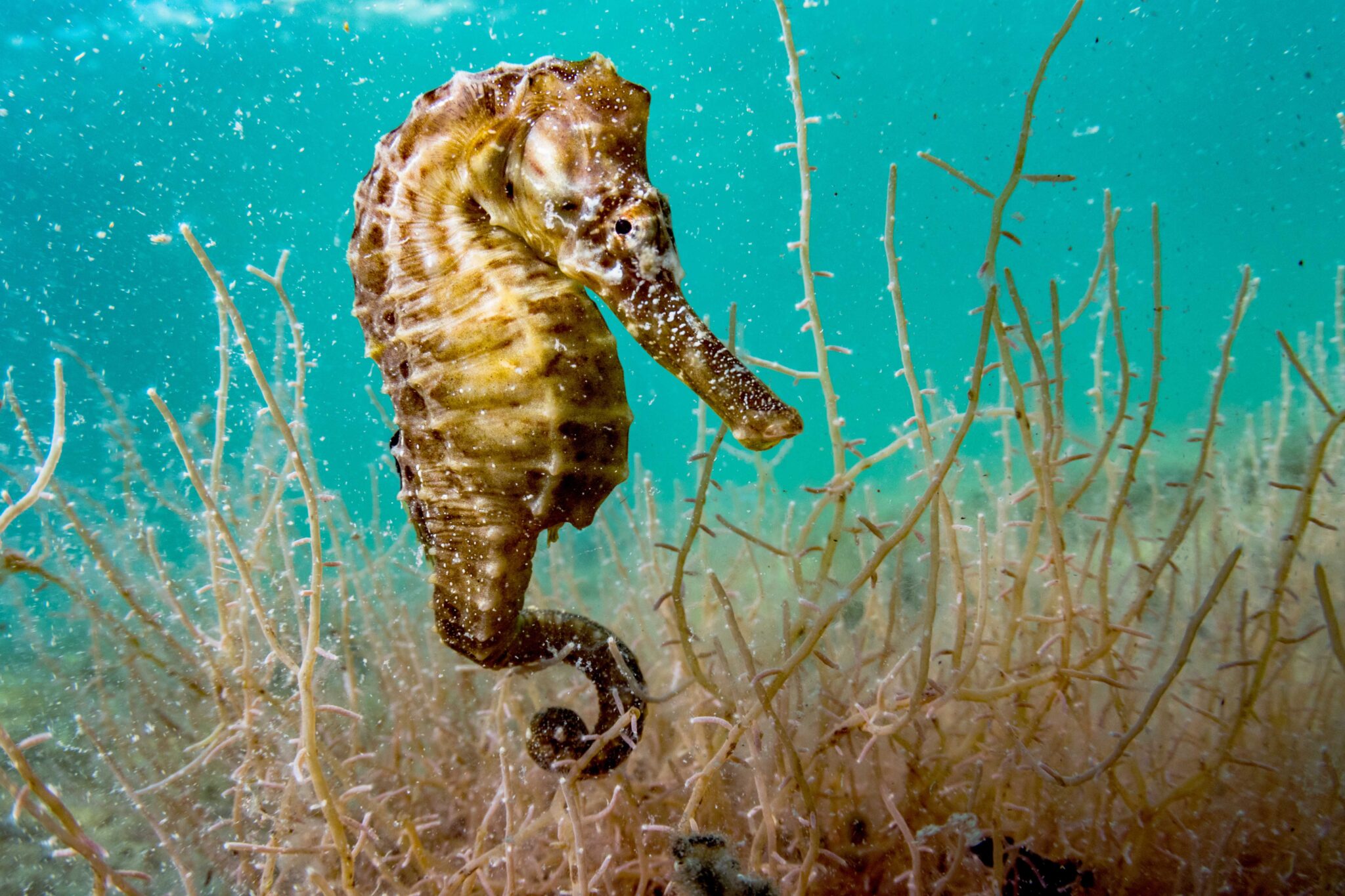
This week has seen the announcement of the designation of Seahorse National Park at Hatchet Bay Cave and Sweetings Pond on Eleuthera. This monumental announcement comes after years of efforts from the BNT and its partners in advocating for the protection of Sweetings Pond and its surrounding areas as an official national park under the BNT’s management.
Sweetings Pond is a large, land-locked saltwater pond in Hatchet Bay, Eleuthera. It has many unique natural features, but the most notable of them all is its incredible seahorse population, which is believed to be the densest population of seahorses in the world. The new 548-acre national park protects the entire one-mile-long pond and the surrounding terrestrial area. The land surrounding Sweetings Pond is a blend of intact coppice, mangroves, and farmlands. In addition, the new national park includes the extensive Hatchet Bay Caves system. This historic cave system is a popular attraction and contains a number of impressive geological features. It is one of the longest dry cave systems in The Bahamas.
Since 2014, the BNT has been leading efforts to have the area declared as a national park. This included years of public outreach and stakeholder consultations in communities across Eleuthera; education presentations in local schools; science and research efforts; and engaging consecutive government administrations. In 2018, the BNT submitted the “20 by 20 Marine Protection Plan” to the government, which included the recommendation to declare Sweetings Pond and other areas in The Bahamas as protected areas.
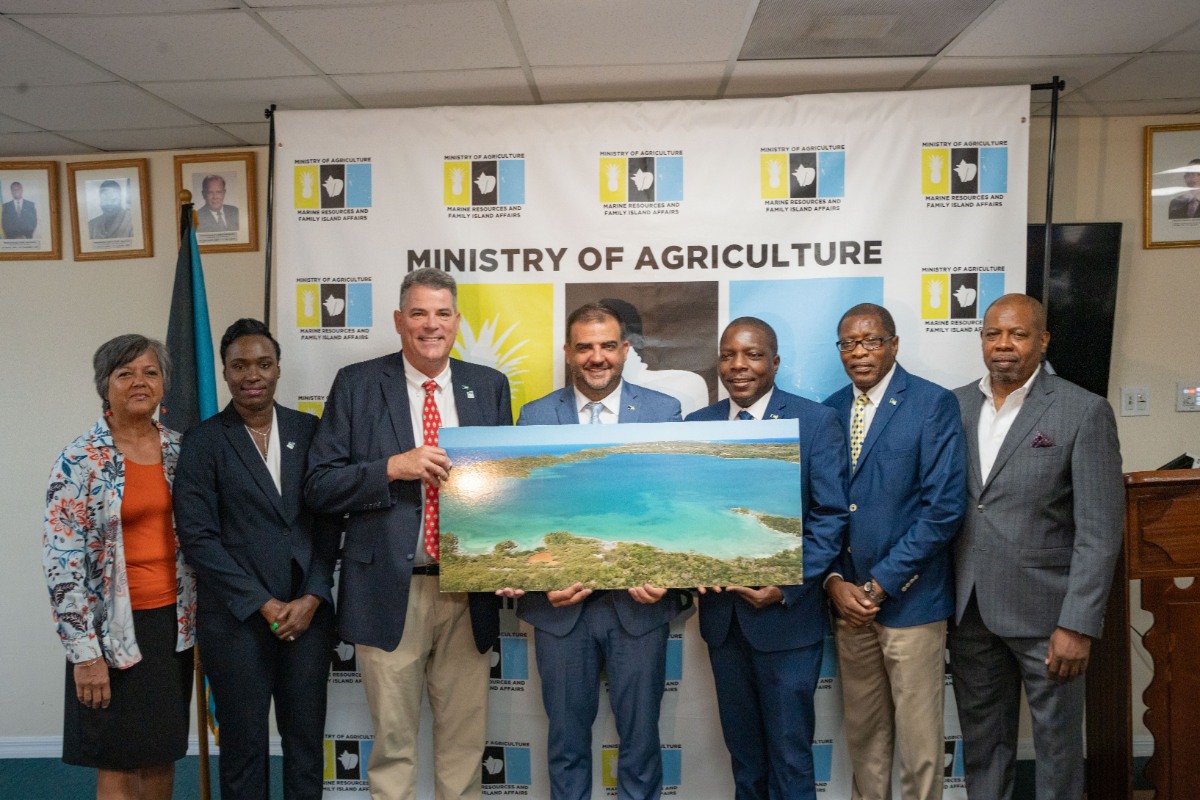
During the lease signing ceremony for Seahorse National Park, Minister Clay Sweeting, said, “This lease agreement for Sweetings Pond has been a long time coming. It represents a milestone in our journey towards sustainable development. It symbolises our collective responsibility to safeguard our natural heritage and create a harmonious relationship between economic progress and environmental preservation.
“I would like to express my gratitude to all stakeholders in this process of drafting and finalising this lease agreement. Their dedication, expertise, and commitment has been crucial in ensuring that this agreement falls in line with our vision of creating a thriving ecosystem while promoting responsible usage. Let us continue to preserve the jewel that is Sweetings Pond for many generations to come.”
The BNT invites the public to stay tuned for more news about its plan for the country’s newest national park: Seahorse National Park at Hatchet Bay Cave and Sweetings Pond!
To learn more about the role the BNT plays in managing terrestrial and marine national parks, conserving wildlife, and informing environmental policy, please visit its website: www.bnt.bs
Follow/subscribe to its various social media channels: Facebook, Instagram, Twitter, and YouTube.
Banner Image: A lined seahorse (Hippocampus erectus), female, clining to algae in an alkaline pond in The Bahamas by Shane Gross
News
PADI Club invites Ocean Lovers on exclusive dive trip to Bonaire this September
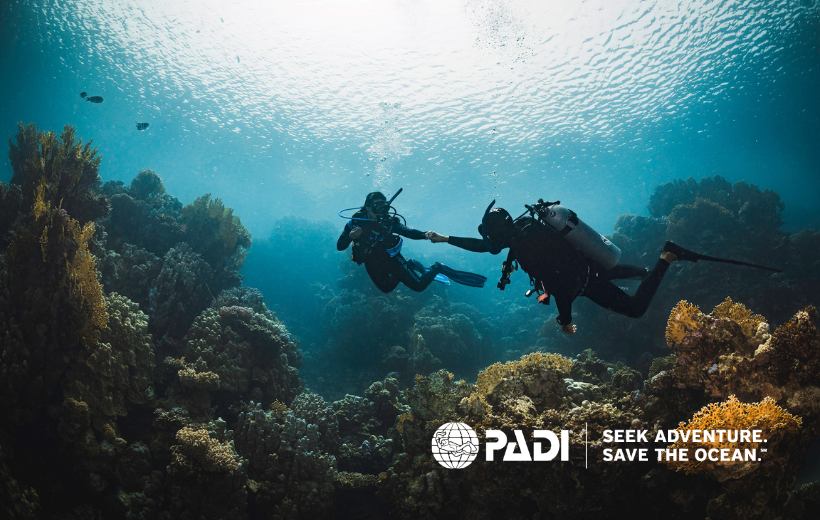
Following the popularity of the PADI Club trip to Belize at the end of July, a second “dive trip of a lifetime” has just been announced by PADI Club to Bonaire this September 23-30, 2023.
Offered exclusively for PADI Club members as part of their yearly benefits, attendees will get to seek adventure while staying at the all-inclusive Buddy Dive Resort, one of PADI’s premier members on the island. Other PADI Members in Bonaire – including Toucan Divers, Divi Flamingo, Wanna Dive, Dive Friends and Scuba Do – will also be hosting various dive experiences throughout the week.
“Bonaire is a unique and beautiful gem in the Dutch Caribbean and we want to show our Club Members this little island looms large as a dive destination,” says Zach Pavkov, PADI Club Operations Manager. “This trip offers participants a chance to not only explore a world-class diving destination but do so through some of the very best PADI Operators.”
PADI Club members will receive a generous discount for this seven-day diving adventure, with packages starting at $1,739 per diver for double occupancy.
Included in the package are:
- social events that include hosted dinners, cocktail parties and live music
- transportation in Buddy Dive Resort’s famous pick-up truck
- daily shore diving and boat diving
- accommodation, with the option to share a room with another solo diver or rent out one, two and three-bedroom apartments to host larger groups of divers
- surface interval activities that include PADI Seminars and island excursions like hiking and bird-watching.
“Because the water surrounding Bonaire has been an established marine park for 44 years, Bonaire is now a top-ranked destination with abundant marine life that includes scorpionfish, flounder and frogfish, moray eels, hawksbill turtles and eagle rays, ” continues Pavkov.
With limited spots available, the list of participants will be decided on a first-come, first-served basis. Those who are not yet PADI Club Members but are interested in joining the trip can sign-up, which will also give them access to:
- 20% of PADI eLearning® programs and PADI Gear™
- a free ReActivate® online refresher
- a free DAN® Prepared Diver course
- a subscription to Scuba Diving® magazine
- access to the PADI Club Celebrity Speaker Series webinars
- brand partner benefits from GoPro, Uber, Salt Life and more
To further support ocean lovers to create positive ocean change, five percent of the PADI Club membership fee will go towards supporting conservation efforts around the globe.
“PADI Club benefits are designed not just to empower divers to explore the ocean, but also enable them to play a pivotal role in saving the ocean too,” says Pavkov. “This year’s additional expedition to Bonaire gives our community the chance to come together and explore our shared blue planet in a truly meaningful and connected way.”
Click here to sign up for PADI Club and reserve your spot here to join the Bonaire dive trip.



